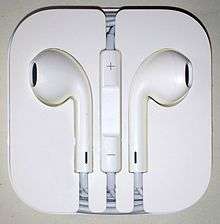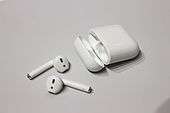Apple earbuds

Apple EarPods are white in-ear headphones included with music players and smartphones designed and marketed by Apple Inc. They are designed to fit the ear while retaining a new design pushed by Apple alongside the iPod and iPod Touch products, with which they were sold together.
History
The basic earbuds have no controls. They ship with all iPods except the fifth generation iPod touch and iPod nano which are shipped with the newer Apple EarPods made in Taiwan rather than Japan.
The fourth generation can be identified by the white border around the speaker and the left and right markings on the front (rather than on the back).
First Generation Earbuds
The first generation Earbuds were packaged with the original iPod, on October 23, 2001.
Earbuds with remote
Same as standard ones, they also feature a built-in remote. They shipped only with the third-generation iPod shuffle.
Earbuds with remote and mic
Shipped with the iPhone 3GS, iPhone 4, iPhone 4S, the third-generation iPod touch, and independently.
Apple In-Ear Headphones
Apple In-Ear Headphones[1][2] (introduced on September 9, 2008, revised on September 12, 2012) are only sold independently. Like the regular earbuds they have a remote control and microphone built-in. They are made available as the high-end earbud offering with dual drivers, advertised as "engineered for superior acoustic accuracy, balance, and clarity".[1] The remote and protective case was redesigned on September 12, 2012, with the remote now matching that of the EarPods and the case subsequently modified with elements of the EarPods case while retaining the triangular shape.
Apple EarPods
| Wikimedia Commons has media related to Apple EarPods. |

Apple EarPods (renamed "EarPods with 3.5mm Headphone plug")[3] (introduced on September 12, 2012) first shipped with the iPhone 5 and feature a remote control and microphone. They also ship with the iPod Touch (5th generation) (without remote and mic) and the iPod Nano (7th generation) (without remote and mic). They are also sold independently.[3] All but the basic earbuds have control capsules allowing users to adjust volume, control music and video playback, and take pictures with Camera application, located on the cable of the right earpiece; those "with Remote and Mic" also include a microphone for phone calls and voice control of certain devices. These in-line controls have a microphone symbol on the reverse to denote their purpose.[4] Users can adjust volume, control music and video playback (play/pause and next/previous,) and record voice memos on supported iPod and iPhone models and Mac computers. There have been many reports of moisture problems with the remote/mic earbuds.[5] The original iPhone and iPhone 3G came with the iPhone Stereo Headset, a push-button and microphone on the right side of the headphones (there is no volume control, and only limited control of calls). Apple EarPods are compatible with iPhone 3GS - iPhone 6S, iPod Touch (2nd generation) and onwards and all models of the iPad and iPad mini. They require iOS 2.2 and onwards for iOS devices but are not compatible with the iPhone 3G or the original iPhone and the iPod Touch (1st generation) due to sound problems. They are also compatible with most Android devices and computers. The EarPods shipped with the iPhone 5 and later, along with those individually sold, come with a carrying case, whilst the iPod Touch (5th generation), iPod Touch (6th generation) and iPod Nano (7th generation) only have basic biodegradable packaging, due to their lack of a remote and mic.
EarPods with Lightning Connector ship with the iPhone 7 and iPhone 7 Plus and work with all devices that have a lightning connector and support iOS 10 or later. They also ship with a headphone adapter for 3.5mm headphones. These adapters work with the iPhone 7 to replace the removed headphone jack.
Apple AirPods

Introduced at the "See you on the 7th" event in September and initially supposed to launch before the end of October 2016.[6] After being delayed from its original launch date,[7] AirPods became available for online purchase on December 13, 2016.[8] The AirPods are wireless earbud-style headphones with microphone, dual accelerometers, IR sensors used to pause the music if they are not in a user's ears, and motion touch sensors that are used to activate Siri. With the lack of an audio jack in the iPhone 7, a wireless connection is one of only two remaining means to connect earphones to the device, the other being digital audio through the Lightning connector. They are advertised to have a battery life of five hours, and come with a charging case that gives them a total of 24 hours of battery life. The case is charged via an included Lightning to USB cable. AirPods are compatible with iPhone, iPad, Apple Watch, Macs, and the 6th generation iPod Touch, but it requires macOS Sierra, iOS 10 and watchOS. They are also compatible with devices on other platforms that support Bluetooth, but the setup process is comparatively complicated and limits the AirPods' functionality.[9][10]
See also
References
- 1 2 Apple In-Ear Headphones with Remote and Mic, Apple Store
- ↑ Apple In Ear Headphones with Remote and Mic, Amazon.com
- 1 2 "Apple EarPods with Remote and Mic". Apple. Retrieved January 19, 2016.
- ↑ Are Your Apple Headphones Real or Fake?
- ↑ Apple Earphones with Remote and Mic Lowest Ratings Archived April 25, 2009, at the Wayback Machine.
- ↑ "Apple - Press Info - Apple Reinvents the Wireless Headphone with AirPods". www.apple.com. Retrieved 3 October 2016.
- ↑ Mark Sullivan (13 December 2016). "Like Apple's AirPods, Doppler's Wireless Earbuds Got Delayed. Here's Why". Fast Company. Retrieved 14 December 2016.
- ↑ Adi Robertson (13 December 2016). "Apple’s wireless AirPods are now on sale". The Verge. Retrieved 14 December 2016.
- ↑ Ashley Carman (September 7, 2016). "Apple AirPods are truly wireless earbuds". The Verge.
- ↑ Ina Fried (September 7, 2016). "Apple’s AirPods do use Bluetooth and they don’t require an iPhone 7". Recode.